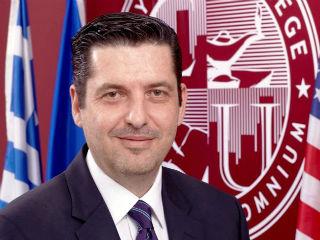In addition, Mr. Geronikolas talked about the 3rd Annual Iraqi-European Business & Investment Forum which will be held in Athens on 11 & 12 July 2018. The initiative of the Arab-Hellenic Chamber of Commerce & Development during the Forum is of particular importance as it represents an excellent opportunity for Greek and European companies with an interest in the Iraqi market at a time when the reconstruction of Iraq is proceeding fast and requires business expertise.
European Business Review: The Arab world constitutes the third EU partner after the US and China. At the same time, it is considered a strategic ally for Greece in the efforts to attract investments. What is the current economic climate in our country with regard to relations with the Arab states?
Harris Geronikolas: Arab-Greek relations, whether on an official or peoples’ level, are considered exemplary in every way and the reason is that this relation has its roots deep into history and throughout this history there were many positive encounters. Lately, we are witnessing interest a growing flow of Arab investment to Greece.
Equally, there is increase in the trade balance between the two sides. However, Greek companies should take the major credit as they have managed, in spite of the crisis, to be resilient and penetrate new markets in the Arab world and successfully created a competitive edge for their products.
EBR: The EU is facing critical issues in the energy sector. The dieselgate scandal, intensive efforts to achieve sustainable mobility through electrification, the reduction of greenhouse emissions by 2030 and so on. How could strategic cooperation with Arab countries contribute to these issues and what would be the potential benefits for Greece?
H.G.: Based on figures, the demand for oil and gas is on the increase. The United States will soon be the number one oil and gas exporter in the world. There is no threat on diminishing the demand of oil and gas for many decades to come, let alone there are new players, such as Cyprus, Egypt and Greece.
Greece will always maintain its position and benefits vis-a-vis the Arab World. We all welcome energy alternatives for it will substantially reduce the environmental pollution and assist in having a cleaner atmosphere. Luckily, this trend is supported, day by day, by the consciousness of people and their practices to have a clean environment in every aspect.
EBR: Turkey’s geographic position is of particular geopolitical importance as it lies between Europe and the Arab world, trying to become an energy hub for the European market, mainly in the field of natural gas. In this light, the country wants to make use of the gas fields in the eastern Mediterranean, aiming at its independence on Russian imports. Do you think that its ambitions could upset the balance in the bilateral relations between Greece and the Arab states?
H.G.: Nobody doubts the advantages of Turkey’s geopolitical location. Greece enjoys more or less the same advantage. As I mentioned earlier, nobody will have the monopoly of controlling the gas supply because you have, for example, Algeria, of which the proximity to Europe gives it quite a competitive edge to continue being a major gas supplier to Europe. As we indicated earlier, the demand for gas and oil is always on the increase for a variety of reasons (industrial applications etc.).
EBR: What do you think are the real challenges for the future of the EU-Arab relations? Is it possible to expand the cooperation among countries with different cultural backgrounds, political system, social structures and economy?
H.G.: From my point of view, Europe has to show and play quite an active role with regard to the turmoil in the Arab world. This is not only a moral obligation for Europe to engage in the current affairs and play a constructive role but it also has its other economic benefits for all sides. Such impasse we are witnessing is really disappointing in global history and what is going on is a stain in the history of our civilization.
Europe’s positive engagement and investing in the Arab world and transferring of its technology and know-how is a win-win situation. Trade and investment will contribute to elevating the economic standard and shall definitely be a major factor in job creation among millions of Arab youth. Such a stand is definitely the answer to the eradication of poverty and the elimination of extremism.
EBR: What is the central message of the 3rd annual Iraqi-European business & investment forum?
H.G.: We aim at enhancing the cooperation between Iraq and Europe and assisting SME’s, especially in Greece, to get more engaged and create new partnerships between the two sides.
EBR: Have the Greek and European companies expressed interest in the initiative regarding the reconstruction of Iraq?
H.G.: Greek companies were quite positive and came forward in response to this initiative. We have now approximately 67 companies, along with their data. We hope that the Iraqi side will review the nature of these companies’ business and initiate contact with their Greek counterparts.
We look forward to a positive outcome. Mind you that our aim at the Arab-Hellenic Chamber is to help SME’s, Greek or Iraqi, in every way to get them together and assist in the creation of a new joint venture and partnership.




 By: N. Peter Kramer
By: N. Peter Kramer

